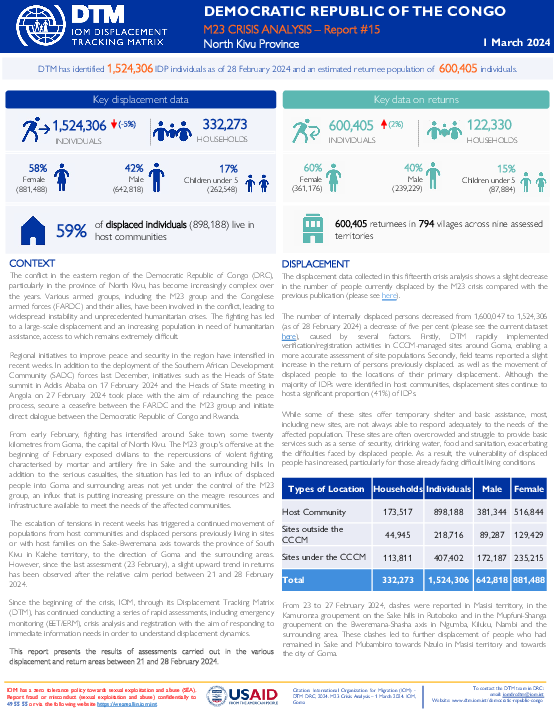-
Countries
-
Data and Analysis
-
Special Focus
-
Crisis Responses
DRC — North Kivu: M23 Crisis Analysis (1 March 2024)

Contact
DTM DRC, iomdrcdtm@iom.int
Language
English
Location
Democratic Republic of the Congo
Period Covered
Feb 21 2024
Feb 28 2024
Activity
- Mobility Tracking
- Event Tracking
The conflict in the eastern region of the Democratic Republic of Congo (DRC), particularly in the province of North Kivu, has become increasingly complex over the years. Various armed groups, including the M23 group and the Congolese armed forces (FARDC) and their allies, have been involved in the conflict, leading to widespread instability and unprecedented humanitarian crises. The fighting has led to a large-scale displacement and an increasing population in need of humanitarian assistance, access to which remains extremely difficult.
Regional initiatives to improve peace and security in the region have intensified in recent weeks. In addition to the deployment of the Southern African Development Community (SADC) forces last December, initiatives such as the Heads of State summit in Addis Ababa on 17 February 2024 and the Heads of State meeting in Angola on 27 February 2024 took place with the aim of relaunching the peace process, secure a ceasefire between the FARDC and the M23 group and initiate direct dialogue between the Democratic Republic of Congo and Rwanda.
The escalation of tensions in recent weeks has triggered a continued movement of populations from host communities and displaced persons previously living in sites or with host families on the Sake-Bweremana axis towards the province of South Kivu in Kalehe territory, to the direction of Goma and the surrounding areas. However, since the last assessment (23 February), a slight upward trend in returns has been observed after the relative calm period between 21 and 28 February 2024.
Since the beginning of the crisis, IOM, through its Displacement Tracking Matrix (DTM), has continued conducting a series of rapid assessments, including emergency monitoring (EET/ERM), crisis analysis and registration with the aim of responding to immediate information needs in order to understand displacement dynamics.
This report presents the results of assessments carried out in the various displacement and return areas between 21 and 28 February 2024.
